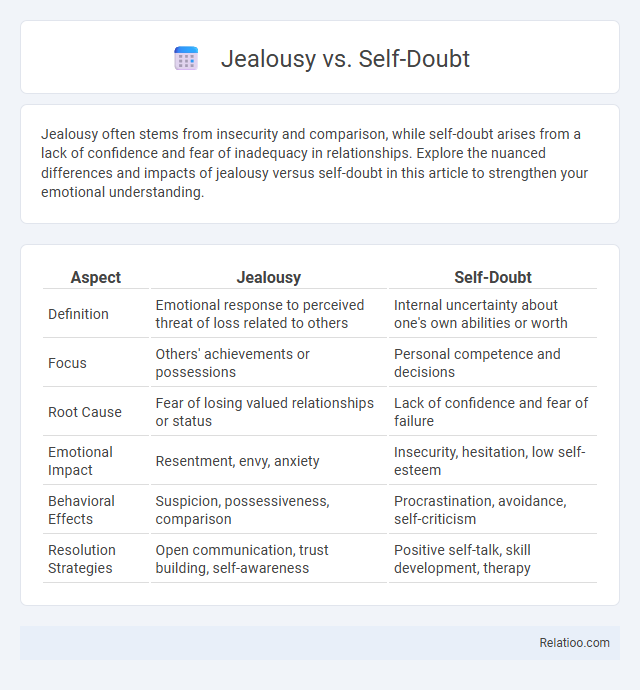Jealousy often stems from insecurity and comparison, while self-doubt arises from a lack of confidence and fear of inadequacy in relationships. Explore the nuanced differences and impacts of jealousy versus self-doubt in this article to strengthen your emotional understanding.
Table of Comparison
| Aspect | Jealousy | Self-Doubt |
|---|---|---|
| Definition | Emotional response to perceived threat of loss related to others | Internal uncertainty about one's own abilities or worth |
| Focus | Others' achievements or possessions | Personal competence and decisions |
| Root Cause | Fear of losing valued relationships or status | Lack of confidence and fear of failure |
| Emotional Impact | Resentment, envy, anxiety | Insecurity, hesitation, low self-esteem |
| Behavioral Effects | Suspicion, possessiveness, comparison | Procrastination, avoidance, self-criticism |
| Resolution Strategies | Open communication, trust building, self-awareness | Positive self-talk, skill development, therapy |
Understanding Jealousy: Definition and Causes
Jealousy arises from a perceived threat to a valued relationship or possession, often driven by fear of loss, insecurity, and comparison to others. Self-doubt involves a lack of confidence in one's abilities or decisions, rooted in internal criticism and uncertainty about personal competence. Understanding jealousy requires recognizing its emotional triggers, such as low self-esteem and past experiences of rejection, which distinguish it from the more introspective nature of self-doubt.
What is Self-Doubt? Key Characteristics
Self-doubt is an internal uncertainty about one's abilities and worth, often marked by hesitation and lack of confidence. It differs from jealousy, which centers on envy towards others, and from anxiety, which involves broader feelings of worry. Key characteristics of self-doubt include persistent negative self-talk, fear of failure, and reluctance to take risks or make decisions.
Jealousy vs Self-Doubt: Core Differences
Jealousy involves comparing yourself to others and feeling threatened by their success, while self-doubt centers on your internal questioning of your abilities and worth. Jealousy often arises from external factors, triggering envy and resentment, whereas self-doubt stems from internal insecurities, leading to hesitation and lack of confidence. Understanding these core differences helps You address the root causes of negative emotions and build healthier self-perceptions.
Psychological Triggers Behind Jealousy
Jealousy often stems from psychological triggers such as fear of loss, insecurity, and low self-esteem, closely linked with self-doubt. While self-doubt primarily involves internal questioning of your abilities and worth, jealousy externalizes these feelings as a response to perceived threats from others. Understanding these psychological triggers behind jealousy can help you address the root causes and build healthier emotional responses.
How Self-Doubt Manifests in Daily Life
Self-doubt in daily life often appears as hesitation before making decisions, persistent second-guessing, and an inner voice that questions your abilities or worth. Unlike jealousy, which involves envy of others, self-doubt centers on internal insecurities and fear of failure. This constant self-questioning can affect your confidence, productivity, and relationships by creating mental barriers to taking action.
Impact of Jealousy on Relationships
Jealousy triggers mistrust and insecurity, often damaging communication and emotional intimacy in relationships. It can lead to controlling behaviors and resentment, eroding the foundation of mutual respect and support. Unlike self-doubt, which is internally focused, jealousy directly affects interpersonal dynamics by creating a constant sense of competition or fear of loss.
Effects of Self-Doubt on Personal Growth
Self-doubt undermines personal growth by creating mental barriers that limit risk-taking and exploration of new opportunities. Unlike jealousy, which stems from external comparison, self-doubt originates internally and often leads to reduced confidence and motivation. Persistent self-doubt can hinder skill development, delay decision-making, and diminish overall potential for achievement.
Recognizing Warning Signs: Jealousy vs Self-Doubt
Jealousy often manifests as resentment or envy toward others' achievements, while self-doubt appears as persistent uncertainty about one's own abilities and worth. Recognizing warning signs of jealousy includes feelings of bitterness when others succeed, whereas self-doubt triggers hesitation and avoidance of challenges due to fear of failure. Differentiating these emotions is crucial for targeted personal development and emotional management strategies.
Strategies to Overcome Jealousy
Jealousy stems from insecurities that often overlap with self-doubt, but it can be managed by cultivating self-awareness and practicing gratitude for your unique qualities. You can overcome jealousy by setting personal goals that align with your values, thereby shifting focus from comparisons to self-improvement. Building strong emotional resilience through mindfulness and affirmations helps maintain confidence and reduces the impact of negative emotions like jealousy and self-doubt.
Building Confidence to Combat Self-Doubt
Jealousy and self-doubt often intertwine, but self-doubt primarily undermines your belief in personal abilities, making it essential to build confidence through positive affirmations and skill development. Recognizing your unique strengths and setting achievable goals can significantly reduce self-doubt's impact, promoting a stronger, more assured mindset. Fostering confidence not only combats self-doubt but also diminishes jealousy by shifting focus from others' successes to your personal growth.

Infographic: Jealousy vs Self-doubt
 relatioo.com
relatioo.com